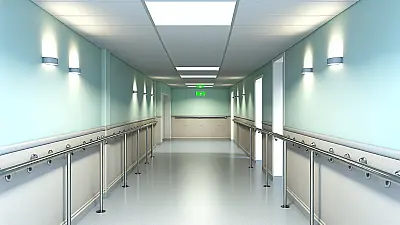EL MONTE, CA - Federal inspectors found serious safety failures at Rosemead Healthcare Center after a vulnerable resident with severe cognitive impairment experienced two preventable falls within three weeks, resulting in facial injuries and highlighting significant gaps in basic safety protocols.

Critical Safety Protocol Failures
The inspection revealed that a resident with bullous pemphigoid, dementia, and paralysis on her right side from a stroke was left at high risk for falls due to fundamental safety oversights. Despite having a documented care plan stating her personal items should be kept within reach, inspectors observed the resident's essential belongings - including her glasses, water, and personal items - stored on top of a three-drawer plastic container positioned beyond her reach near the head of her bed.
This arrangement directly contributed to a fall on April 9, 2025, when the resident "attempted to stand up from her bed to reach her glasses from the drawer and lost balance." She was found sitting on the floor with the right side of her head against the plastic storage container, sustaining discoloration to her right forehead, right eye, and right hand, along with swelling that required immediate X-rays.
The medical consequences of this setup were predictable and preventable. For residents with hemiplegia affecting their dominant side, reaching across their body or attempting to stand independently poses extreme fall risks. Standard nursing protocols require frequently used items to be positioned within the unaffected arm's reach to prevent exactly this type of incident.
Delayed Response to Safety Changes
Even more concerning was the facility's failure to properly update the resident's care plan after her falls. The resident experienced an unwitnessed fall on March 20, 2025, followed by the injurious fall on April 9. However, her care plan wasn't revised until April 25 - 16 days after the second fall.
According to the facility's own policies, care plans should be revised within 72 hours of a fall incident to implement new safety interventions. The MDS Nurse confirmed during interviews that "the care plan should have been revised on 3/20/2025 and 4/9/2025, not revised on 4/25/2025."
This delay is medically significant because immediate post-fall assessments often reveal new risk factors or changes in a resident's condition that require prompt intervention. Each day without updated safety measures represents continued exposure to preventable harm for residents who are already highly vulnerable.
Missing Safety Assessments
The facility also failed to conduct required quarterly fall risk assessments. Despite their policy requiring assessments "upon admission, quarterly, and with significant change of condition," no quarterly assessment was completed in March 2025 when one was due.
The Director of Nursing acknowledged that quarterly assessments are "important to assess and identify if Resident 1 was still at high risk for falls and to identify new interventions to implement to ensure Resident 1's safety." For residents with progressive conditions like dementia, these regular evaluations are essential for detecting declining mobility or cognitive function that could increase fall risk.
Resident Rights Violations
Beyond safety concerns, inspectors found the facility failed to honor the resident's family's request for her to eat meals in the dining room. Despite a documented January 2025 meeting where family members specifically requested this accommodation, staff continued making arbitrary decisions about meal locations based on their convenience rather than the resident's or family's preferences.
A certified nursing assistant told inspectors that "Resident 1's assigned CNA for the day decided whether Resident 1 would have her meals in the hallway, dining room, or in her room." This approach violates federal requirements that residents have the right to choose their daily schedules, including eating locations, and represents a concerning disregard for person-centered care principles.
Medical Context and Industry Standards
Falls represent one of the most serious safety risks in nursing homes, particularly for residents with cognitive impairment and mobility limitations. Research consistently shows that environmental modifications - such as keeping personal items within reach - can significantly reduce fall rates among high-risk residents.
For residents with stroke-related paralysis, the risk is amplified because they may not accurately assess their physical limitations due to cognitive impairment. Standard protocols require comprehensive environmental assessments and immediate care plan updates following any fall to prevent recurrence.
The facility's own policies aligned with industry standards, requiring 72-hour care plan revisions and quarterly risk assessments. However, the gap between written policies and actual implementation created dangerous conditions for vulnerable residents.
Additional Issues Identified
Inspectors documented other concerns including inadequate fall risk monitoring and insufficient attention to resident preferences in daily care decisions. The facility's failure to develop proper care plans for accommodating family requests further demonstrated systemic issues with resident-centered care planning.
These violations collectively point to broader concerns about the facility's commitment to maintaining basic safety standards and respecting resident rights in accordance with federal nursing home regulations.
Full Inspection Report
The details above represent a summary of key findings. View the complete inspection report for Rosemead Healthcare Center from 2025-05-01 including all violations, facility responses, and corrective action plans.
💬 Join the Discussion
Comments are moderated. Please keep discussions respectful and relevant to nursing home care quality.